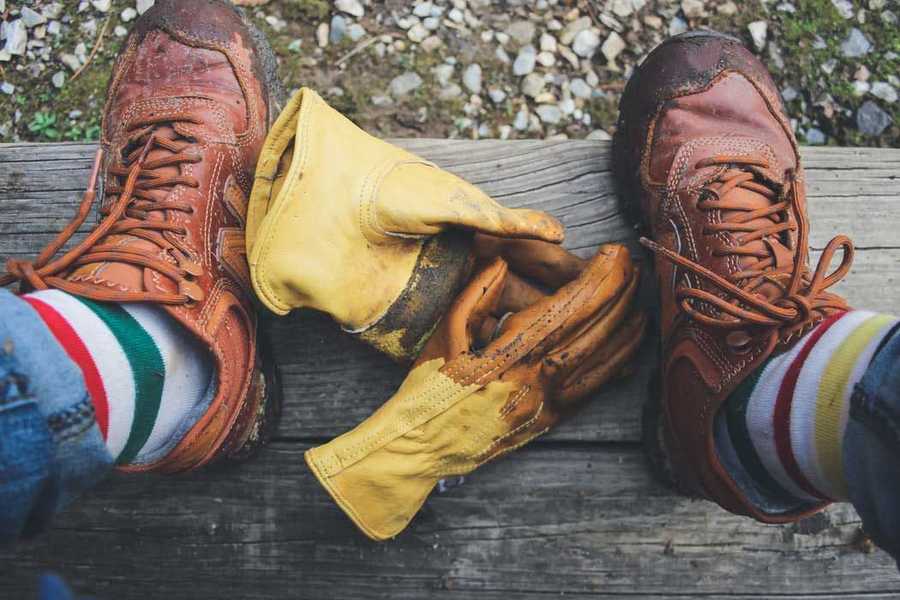Let's talk about leg problems in the skilled trades industry.
The skilled trades industry can offer profitable occupations yet these come with health risks. We need to talk more about leg problems in the skilled trades

Working in the trades can be really rewarding - both emotionally, when you help people in various states of despair over household breakdowns, and financially. In fact, demand [1] for plumbers is expected to rise by 21% until 2022 vs 11% across occupations.
The health and safety risks associated with plumbing and working in the trades sector should not be underestimated either. The main occupational hazards include:
- Exposure to hazardous substances such as: lead, sulfur dioxide, asbestos, silica, mould, adhesives, solvents, solder, dusts, and other hazardous products.
- Proximity to flammable products.
- Exposure to biohazards including raw sewage when working on sewage pipes or septic tank outlets, when laying new pipe in soil or flood clean-up.
- Potential infection from bird or rodent droppings.
- Working in awkward positions, or performing awkward manual tasks which increases the risk of musculoskeletal injuries.
- Lifting heavy or awkward objects.
- Working in confined spaces.
- Working at heights (e.g., on platforms/scaffolding or ladders).
- Risk of eye injury from flying particles.
- Slips, trips and falls, especially when working in wet environments.
- Burns from hot equipment parts, steam lines, and the release of hot water or steam.
- Working with various tools (both hand tools and powered tools).
- Shift work or extended work days.
- Working alone.
When we consider the long-term physical health risks, musculoskeletal injuries is an accurate, yet somehow too broad description of the pains that tradespeople can suffer on daily basis, and which can affect the quality of their life. It is also not proactively pointed out as a likely consequence of working in the trades/construction sector. Yet a study shows that "according to a number of epidemiological and ergonomic studies, the construction industry is in the top three occupations for work-related musculoskeletal disorders (WMSDs)".
The same study concludes that "the prevalence of musculoskeletal 'trouble' shows that while there is considerable variation between trades in the levels of problems reported in different parts of the body, there is no distinct separation of any one trade from the rest of the industry. Instead, the parts of the body worst affected appear to be trade-specific."If we consider existing literature to be an accurate indicator of the severity of a problem, then the fact that "published scientific literature concentrates on disorders of the low back, the upper limb, and the knees" in the trades sector, we would reach the conclusion that these are the most common problems tradespeople are seeking advice and help for.
In 2018, a survey on 184 plumbers conducted by the IPG brought forward some worrying discoveries. 75% of the surveyed working plumbers experienced problems with their knees, yet only 41% had discussed the issue with their GP. Furthermore, 57% of plumbers surveyed felt that they would need to undergo knee replacement surgery in the future due to the hardships of the profession. 59% also felt that they would be forced to retire early because of the injuries they pick up in their work.
The Health Issues
A common problem is what is known as "housemaid's knee" (or as plumbers know it, "plumbers' knee"). It is caused by inflammation of a small fluid-filled sac (the bursa) in front of the kneecap. It more commonly occurs in people who spend long periods of time kneeling [3], such as workers in the trades/construction industry. Despite its name the problem is more common with in males than in females.
The symptoms of a housemaid's knee can affect a tradesperson's life, and their ability to perform the job, on which their income ultimately depends. People suffering from housemaid knee will experience difficulty bending their knee, kneeling or even walking.
Further leg injuries are caused by the repetitive movements, unavoidable in this sphere of work. Repetitive motion injuries develop over time and can be difficult to identify until they develop. These can include muscle strains and sprains, and damage to the ligaments, muscles and disks.
Dan Francis, a 34-year-old bathroom and kitchen installation technician, works for a local employer in West Sussex. His job incorporates, plumbing and tiling amongst many other things and he had also been working for just 12 years when he developed bursitis in one of his knees.
Dan said: "The pain was excruciating. I couldn't put any weight on my affected leg and no number of painkillers were helping. One day the bursitis burst and left a massive gaping cavity in my knee."
Dan didn't take the weeks off that he was advised, as his income depended on working. Recovery eventually took six weeks.
A quick search around the plumbing trade forums show, that there is easily a whole thread dedicated to tradespeople's knee problems. [4]
User Dannypipe says: "I've worn kneepads or padded trousers since I started, pretty much most days, and my knees are still done. Started in my teens and now I'm 34. SO still pretty young.
If I spend the whole day in the same spot, they feel as though someone has thrashed them, but days ago. They just ache."
ROCK1 says:"I'm 24 and I already have back trouble, bad knees and my left wrist has a tendon that pops out of place and cause my hand to go stiff! I reckon I'll be on a zimmer frame by my 35th birthday!!"
Combine this with the government's speculations of increasing the pension age to 75 years and the picture painted becomes darker and darker.
The Long-Term Implications
When the Guardian asked its readers to share their opinions on the potential increase, a reader under the username of bouledesuif raised a point, which hits painfully close not just for plumbers but tradespeople in general:
"My plumber is only 50 and his knees are gone, after some failed keyhole fiddling, his doctors told him to go and have physio because he is "too young" for knee replacement. He went for physio and the physio told him there was nothing he could do for him, and he has now gone to a sports injury specialist.
Nothing like this will get him working properly again, and being self-employed, when he has gone through all the criteria required by the NHS, even then the recovery period from knee replacement will make it hard to get by financially.
There are many people like him, who are not academically suited, and it is quite ridiculous to say that they should be working after 65. Most electricians I know have arthritis in their wrists, plasterers are finished after 40, site carpenters and joiners get tinnitus, lung complaints and arthritis and not many can keep going after 60.
Britain has a growing skills crisis: who can advise a young person to take up a trade when the stage comes that your body is worn out, you are left high and dry for years before you get a small pension?"
Having all this in mind, it is worrying that there isn't more initiative for raising awareness among tradespeople and apprentices when it comes to leg injuries, and potential long-term implications.
We need to talk and teach more about preventive measures and early recognition of symptoms, as well as responsible attitude towards the problem once it has occurred. Leg problems should not just be brushed off, it is our legs that keep us going, after all.
Related advice
There are plenty of actions you can take to help keep your home in check. Take a look here for the latest guides, advice and tips from our experts!
View our latest advice







